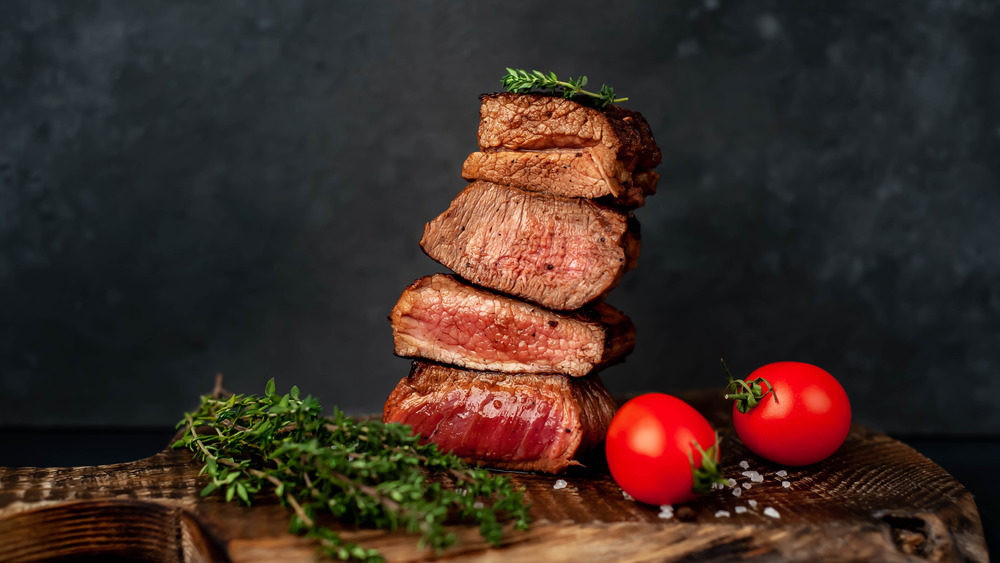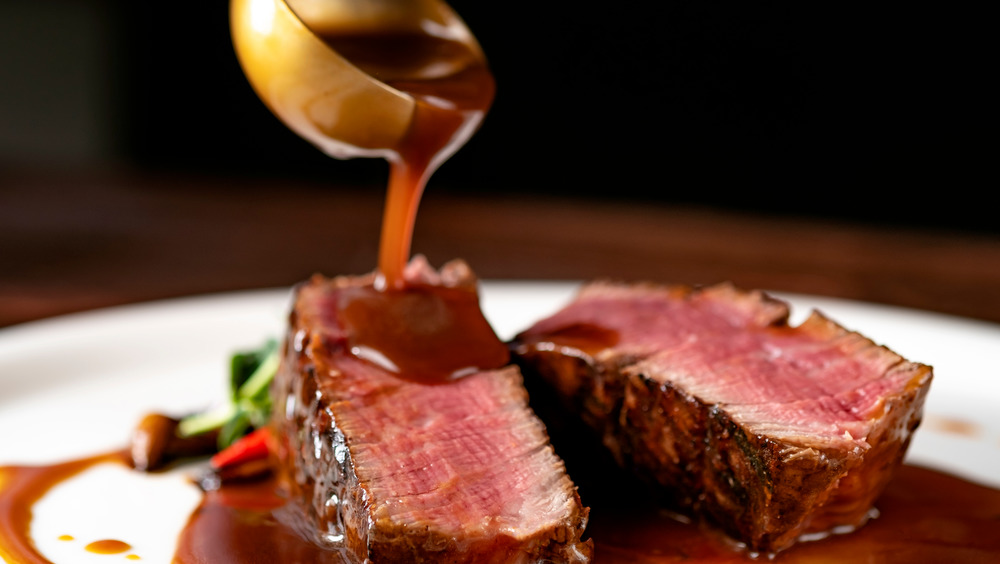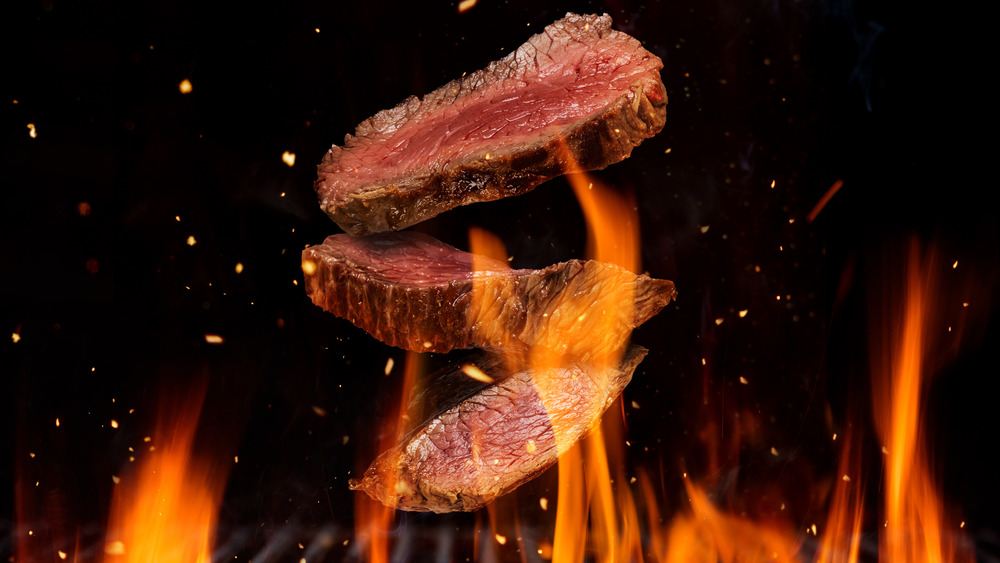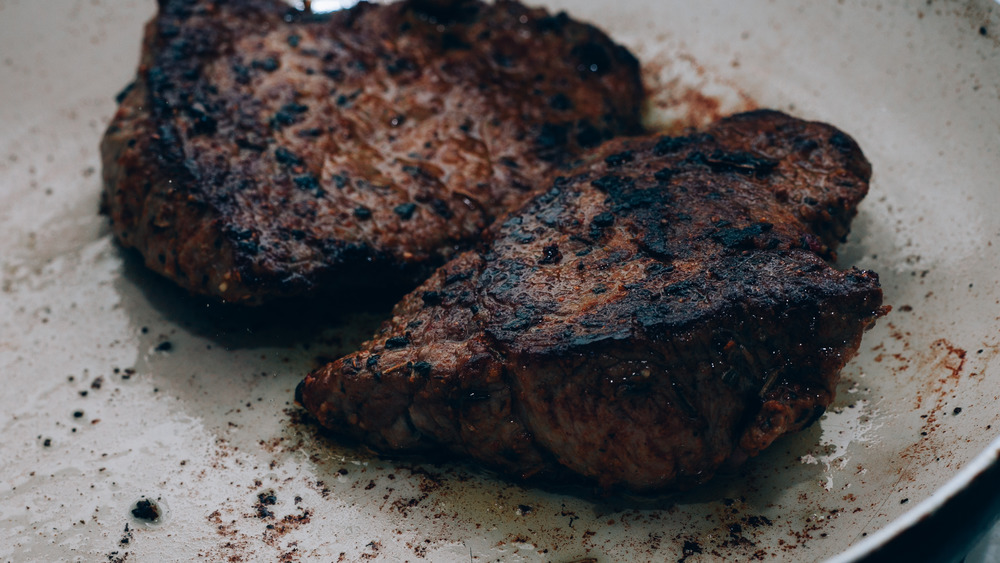Here's Why You Should Never Order Your Steak Well Done
How do you like your steak? According to Longhorn Steakhouse, about 12 percent of customers ask for their steak to be cooked well done (via FiveThirtyEight). But if chefs made that decision for you, then hardly anybody would see a steak with all the pink cooked out.
You might argue that a steak's temperature — about 160 degrees for well done, and 135 degrees for medium rare (via Certified Angus Beef) — is a matter of personal choice. If people like their steaks well done, shouldn't they feel free to order it that way? Restaurant staff isn't going to tell you that you're wrong if you ask for your steak well done, and in most cases, they'll go ahead and make it for you. But to some chefs, well done isn't a temperature. It's overcooked. "Personally, I think serving bad food is not OK and that overcooking anything shouldn't be done," Chicago restaurant owner Nick Kokonas told The Takeout. Kokonas added, "Some things are personal preference and in the case of a basic steak, sure, burn it if the customer prefers that."
Some restaurants might try to steer their well-done-loving customers in another direction. The general manager of 3rd Street Tavern in St. Peter, Minnesota, told The Takeout, "Our smoked chicken is fantastic, so if we can get somebody into that versus a well-done steak, we'll try to take that opportunity."
For peak flavor and juiciness, choose medium rare
So what exactly is wrong with well-done steak, anyway? According to The Spruce Eats, getting the interior of a steak that hot hardens the muscle fibers and burns off a steak's juices. Some chefs will tell you the ideal temperature to order is medium rare. It "maintains the most flavor and it keeps the juice in the meat," the founder of the BLT Steak chain told the New York Post. While it may not seem like much, that 25-degree temperature difference can change a cut of meat from tender and pink to brown, chewy, and dry — closer to shoe leather than a steak.
A thread on Reddit suggests that some people have the mistaken belief that any redness inside a steak is a sign the meat isn't fully cooked and may make you sick. The U.S. Department of Agriculture tells us it's safe to eat steaks at lower temperatures, while hamburger patties and ground beef, in general, should be cooked well done. That's because there's a chance that bacteria has been mixed into the inside of a burger patty (via Today).
Well-done meat might cause cancer
It turns out that cooking a steak well done might even be more dangerous than cooking it medium rare (via The Globe and Mail). The high temperatures involved in well-done cooking can cause a chemical reaction that creates heterocyclic amines, or HCAs. These chemicals have been shown to cause cancer in lab animals. Other studies have shown that people who eat well-done meat over a long period of time have a higher risk of certain cancers. There are ways to reduce the amount of HCAs in a well-done steak, but one of them involves microwaving the meat first and then draining the juices out. Talk about shoe leather!
According to the National Cancer Institute, research shows that eating red meat in general probably causes cancer, regardless of how thoroughly it's cooked. Government scientists recommend that you limit your red meat consumption.
If you don't take the sage advice of chefs to order your steak medium rare, that's up to you. But be warned: Ordering a well-done steak might allow the chef to get away with some sketchy kitchen practices.
Using inferior meat for well-done steak
On another Reddit thread, employees or former employees of restaurants shared their advice on menu items to avoid. The anonymity allows them to dish on the dirty side of the restaurant business without having to worry about any consequences from their employers (via Food & Wine). One comment read, "NEVER order a steak well-done. I guarantee you that the chef will pick the oldest, s****iest meat from the back of the shelf. You'd be better off ordering a burger."
The idea here is that if you take an old or tough cut of meat, it'll be far easier to notice its inferiority if it's cooked to a lower temperature. If it's cooked well done instead, it can be pawned off on a customer who doesn't mind that it's turned into a hockey puck — tough, burned, and dry — without noticing that it was a bit off in the first place. A steak connoisseur, on the other hand, would probably order their steak medium rare and would notice that it wasn't the greatest cut of meat to begin with.



